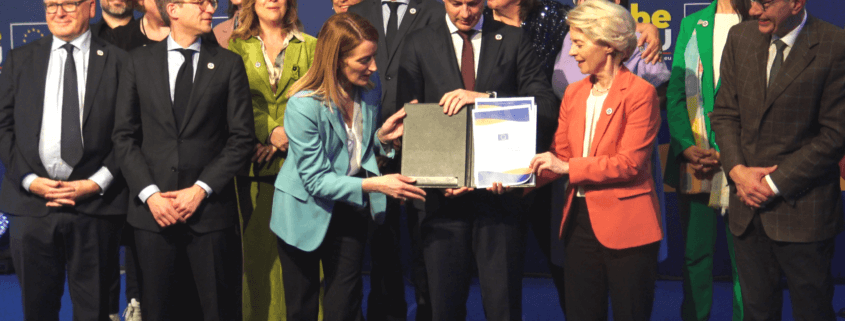Social partners celebrate the high-level declaration for EU social rights and economic prosperity
- The three EU institutions, the EU Parliament, the EU Commission, and the Council of the EU, together with social partners and economic stakeholders, sign a Declaration to ensure “economic growth” linked to the “European social market and the EU Pillar of Social Rights”
- On the 15th and 16th of April, high-level representatives, economic agents and social partners gathered in La Hulpe (Brussels) to sign a joint declaration in favour of the EU Pillar of Social Rights
- Artificial Intelligence, shortage of skills and gender equality have been highlighted as essential challenges to be tackled by social partnership.
- Here is the link to the Declaration on the Future of the European Pillar of Social Rights (2024) [click here +]
16 April 2024. La Hulpe (Brussels)
The auditorium erupted in thunderous applause after the European Trade Union Confederation announced it would join and sign the La Hulpe Declaration. “We must remain committed to a social market Europe in the face of the danger of a new wave of austerity,” warned the Secretary General of ETUC, Esther Lynch.
The declaration was necessary because, in the words of Lynch, “it is a recognition of the importance of the right to collective bargaining and action, the freedom of association and assembly, as well as the need to respect the prerogatives of trade unions and to act against union busting” and [the Declaration] “will support us in keeping social progress at the core of the agenda of the European institutions for the next term”
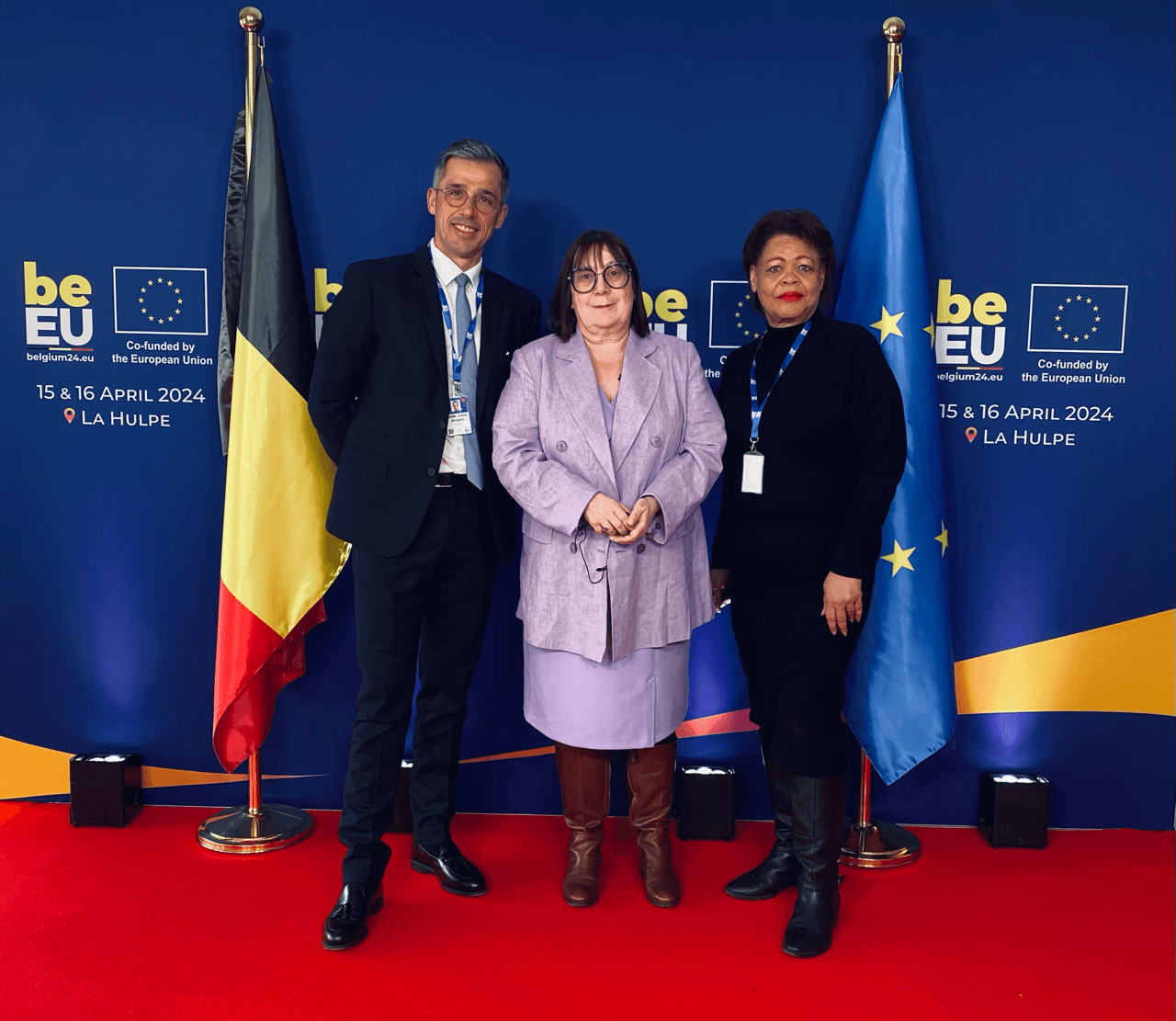
“The conference on the European Pillar of Social Rights has also focused on what will make Europe economically successful,” says Maxime Legrand, President of CEC European Managers, after the Declaration was signed at the High-Level Conference on the European Pillar of Social Rights.
“It is important for managers to be represented in these important political venues so our voices are heard, especially when European Elections are just around the corner.”
Maxime Legrand, President of CEC European Managers
CEC European Managers has represented managers at the event, both those who are members of Eurocadres as well as the members of CEC, and it has also endorsed the Declaration of La Hulpe and provided reflection and explanations on the managerial staff reality to ministers, policymakers and stakeholders, as bridge-builders between employers and employees.
Today, at La Hulpe, the importance of Europe’s unique social market economy—combined with pursuing a highly productive, competitive, and innovative economy that is attractive for investments and fostered by a dynamic single market—has been strengthened.
The European Commission, the Council of the EU, and the European Parliament, together with social partners and economic agents, call for a reinforcement of European cross-industry and sectorial social dialogue, continued support for the social partners and their agreements, and social partners’ involvement in EU policy-making, including in the implementation of the green transition.
The declaration is “a good agreement,” and “I’m thankful to the Belgian Presidency for inviting us to participate at this conference”, reflects President Legrand. “It is important for managers to be represented in these important political venues so our voices are heard, especially when European Elections are just around the corner.”
Social Affairs before the EU Parliament Elections
A few weeks before the European Parliament elections, the High-Level Conference on the European Pillar of Social Rights has gathered ministers from several European Union countries and stakeholders to dialogue and agree on a joint declaration with the continent’s social partners.
As expected, the conference has been highly politically charged, with gender equality, Artificial Intelligence, shortage of skills, and even enlargement high on the agenda.
Organised by the Belgian presidency of the Council, which has a markedly social character and is aligned with the specificity and uniqueness of the European social dialogue, the High-Level Conference on the European Pillar of Social Rights has been both a collaboration meeting point, an instrument for sharing the ongoing national social policies and an opportunity to endorse the utility of social dialogue.
This joint call for social dialogue, gender equity in the working world, or the rethinking of national educational systems is made in the face of nervousness and uncertainty about the support that Eurosceptic or ultra-conservative parties are expected to receive in the next elections.
The European Pillar of Social Rights, endorsed
The 27 Member States of the European Union agree that climate change, green and digital transitions, demographic changes, and geopolitical tensions will pose new threats to the EU’s social cohesion. Further implementing the European Pillar of Social Rights is key to mitigating their impact on our citizens.
The European Pillar of Social Rights provides a comprehensive framework of principles that guide our EU and national policies on equal opportunities and access to the labor market, fair working conditions, and social protection and inclusion.
Strengthening the implementation of its principles is crucial to achieving a Europe that “cares, prepares, and protects.” The conference’s participants have repeatedly shared this idea, and as European managers, we can rely on this messaging.
While social rights and the need to reskill European professionals seem to be an area of common consensus, the ways to increase cooperation between Member States in the field of accreditation and training, as well as the debates on how to transform new skills into rights, do not seem to generate a uniform position.
Strengthening the implementation of the EU Pillar of Social Rights is crucial to achieving a Europe that “cares, prepares, and protects.”
“The essence of La Hulpe’s Declaration is that of envisioning a Europe that cares and a Europe that protects; no one will left behind if we use the EU Pillar of Social Rights as a compass,” said Deputy Primer Minister and Minister of Social Affairs and Health, Frank Vandenbroucke at its opening speech, an occasion in which he has remembered his words during the Trade Union Social Summit on the European Pillar of Social Rights on the 27th of March in Brussels, “Social Dialogue is an essential modus operandi of the European Union”, words that the social partners have appreciated.
Participants at the conference are aware of the upcoming European elections, and the corridors of the high-level conference are filled with political statements, reflections, and assessments.
Social Dialogue is an essential modus operandi of the European Union
Frank Vandenbroucke, Deputy Prime Minister and Minister of Social Affairs and Health (Belgium)
For instance, Dragoș Pîslaru, Chair of the European Parliament Committee on Employment, took the floor to explain the efforts carried out during the ongoing legislature to “foster industry competitiveness and productivity without opposing them to the investment in social affairs”.
Oliver Röpke, President of the European Economic and Social Committee, also called on the policymakers to ensure that “social policy is at the cornerstone of a thriving democracy because investing in social areas always has a positive impact on the economy”.
Thriving democratic values is what Europe needs to move forward with its unification process. However, most social aspects of policymaking are still generally the competence and responsibility of the EU member states and are, to some extent, subject to local and geopolitical tensions.
Knowing that, Röpkle mentioned the EU integration of the countries from the western Balkans in his speech. He acknowledged the geopolitical urgency of integration but reminded candidate countries of the “need to empower social partners and promote social dialogue.”
Finally, Heather Roy, President of the Social Platform, has listed the expectations of European citizens and has asked for a response from European politicians that is up to the needs of the population.
“We have, at least, to take out of poverty 15M people in Europe by 2030,”, said Roy, and she has placed the following duties on the institutions: “The Council must include social policy as a priority within forthcoming strategic agenda, the EU Commission must include social policy and the European Parliament must remain steadfast in building social Europe”.
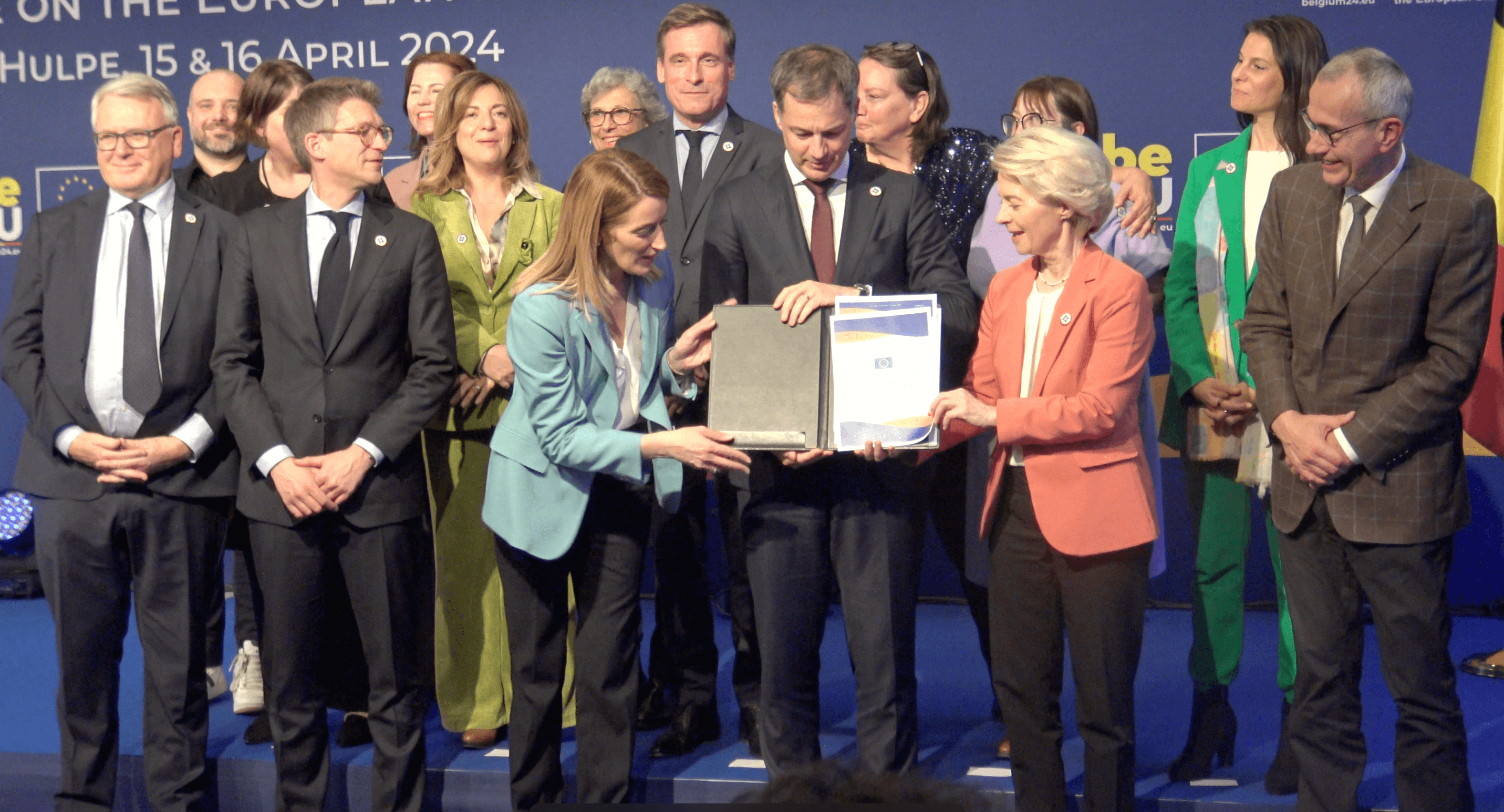
Declaration of La Hulpe – Signature, 16 April, 2024
Social Challenges: Gender Equality and Artificial Intelligence
“Women are in clear disadvantage regarding the new emerging jobs”, said Carlien Scheele, Director of the European Institute for geneder Equality (EIGE) at the labour market and gender equality debate. Among the reasons why this is happening, she stated that while “more women than men graduate from university, this not reflected in labour market”.
The role of women in European societies is still far from compared to men. In fact, “56% of women with children under 12 years old, spend more than 5h a day with them, but only 26% of men dedicate the same amount of time to their families”. When speaking of managerial staff, women are more often asked to respond to demands linked to emotional issues, such as dealing with difficult clients, compared to men.
New technologies could increase the gender gap, and for that, one of there is a real and urgent need for action regarding the role of Artificial Intelligence in the workplace.
This is, in fact, one of the main takeaways of the afternoon debates, together with a need for a strategy for gender equality for the next mandate of the EU institutions.
“56% of women with children under 12 years old, spend more than 5h a day with them, but only 26% of men dedicate the same amount of time to their families”
Carlien Scheele, Director of the European Institute for geneder Equality (EIGE)
Among the biggest fears of citizenship is the feeling of being manipulated by arbitrary and unexplainable algorithm decisions, which makes Artificial Intelligence seem like an intrusive technology. Policymakers and stakeholders have pointed out the lack of updated European legislation to tackle these perceived threats, despite the AI Act.
Throughout the afternoon of the first day, Ministers of Hungary, Greece, Italy, France, Austria, and Poland discussed pressing matters such as how to support analyses of labour market trends and better provide training support to needy groups.
Domma Michailidou, Minister of Labour and Social Insurance of Greece, has pointed out the need to facilitate and adapt to employees’ current demands, such as the right to remote working, for which Artificial Intelligence is essential.
Mental health and its connection to social rights have also been on the table. The need to endorse the World Health Organization (WHO) One Health perspective makes it imperative for European politicians to respond.
“4% of European Union’s GDP is affected by Mental Health issues” claimed Johannes Rauch, Minister of Social Affairs, Health, Care and Consumer Protection of Austria. “We should try to see what our national agendas have and find ways to utilise them for our common good”, he claimed
Fadila Khattabi, Minister Delegate for Seniors and People with Disabilities in France, added, “Public services contribute to inclusive growth, and they play a crucial role in people’s well-being.”
Minister Khabatti also shared a short conversation with CEC European Managers president, Maxime Legrand, in which they agreed to keep on collaborating and talking to improve managers’ conditions and recognition.
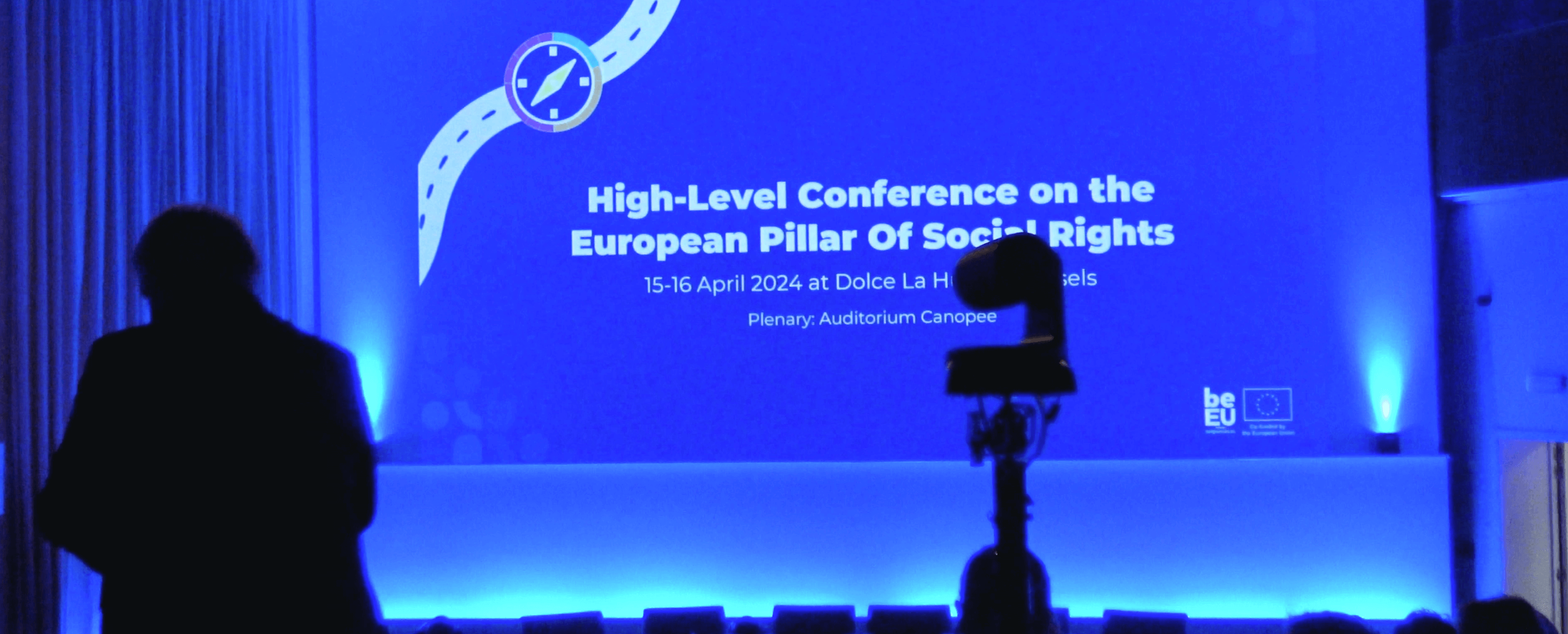
Better education to tackle the shortage of skills
The main aspects addressed on the morning of the conference’s second day have been skills shortages and education.
The need to be aware of “where the new jobs are” and what it takes to “manage and upskill teams” has been in the spotlight at the Labor market policies for a fair transition: right to lifelong learning, incl. skills debate.
After that, Mario Draghi eclipsed the conference with powerful takeaways, such as the fact that “we have not taken our external competitors seriously enough and some of them are not playing by the rules.” and the warning that “our European finance, our European solutions are adapted to yesterday’s world”.
We have not taken our external competitors seriously enough and some of them are not playing by the rules.
Mario Draghi, former President of the European Central Bank
Finally, CEC European Managers has been present at the signature of the Declaration, in which Belgian PMs talked about the ambition of this Declaration: “We are indicating together the way to shape common policies. Today is a day of ambition”. Indeed, the signature of the Declaration is seen as a roadmap towards the next legislature. “We are all about prosperity, but also inclusion” said Frank Vandenbroucke who remembered Jacques Delors and thanked Presidents of the EU Commission and EU Parliament for the support received during the hard negotiations.
President of the European Commission Ursula Von der Leyen took the floor at the High-Level Conference, endorsing the European way of life and the renewed social dialogue fostered by the latest EU Commission: “Business can be made everywhere in the world, but people want to live where they can feel protected and their families can thrive” and added, “Never in the history of Europe has there been so many people employed.”
Finally, the President of the EU Parliament, Roberta Metsola endorsed the Declaration with a final optimistic quote: “European social market is a global beacon,” but remembered that many people in Europe experience inequality and exclusion and policymakers should not forget that citizens are not asking for the impossible, “it is not too much to ask, and it cannot be too much to deliver”.
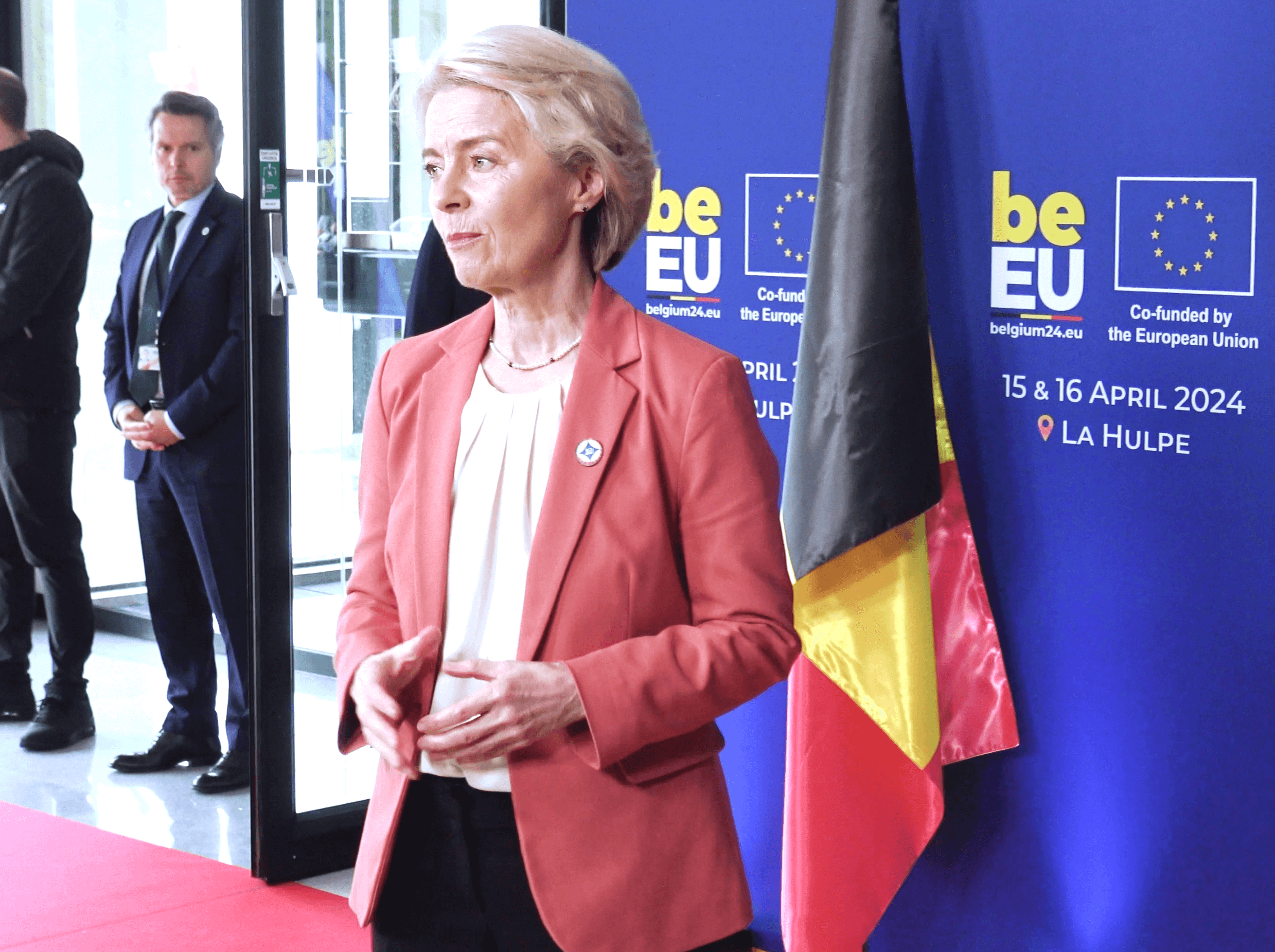
A great opportunity for managers
Statement by Maxime Legrand, President of CEC European Managers
La Hulpe 16 April, 2024
“We have come here, to La Hulpe, invited by the Belgian presidency of the Council of the European Union, to give voice to the needs, challenges and to highlight the capabilities of European managers, which are the bridge-builders of the future.”, said Maxime Legrand, as an acknowledgement to the markedly social orientation in favour of European social dialogue by the Belgian presidency.
“We are here to represent the voice of European managers, those affiliated to Eurocadres and those belonging to our organisation, CEC European Managers.
This conference will, of course, focus on the European Pillar of Social Rights, something we see as a requisite to make Europe economically successful,
It means indeed to speak about new technologies, skills, training, inclusion and how wealth and the added value created will be redistributed among economic agents.
A few weeks before the European elections, this is a great opportunity for us CEC European Managers to make our demands heard, the fruit of our meetings with you European managers.
You shape the world through the daily decisions you make in the companies.
As we often say, we build a direct line between your expectations on the ground and the political decision-makers, those who are now deciding the world of tomorrow!”

